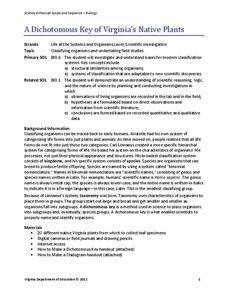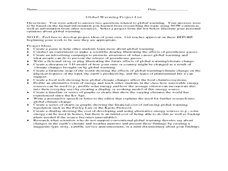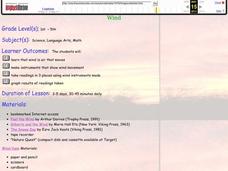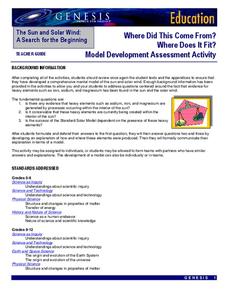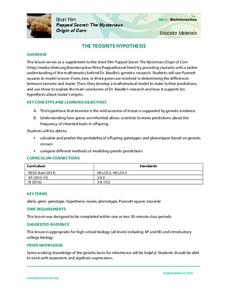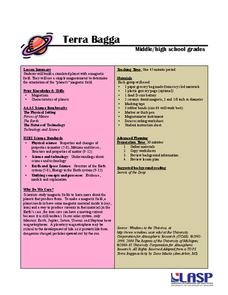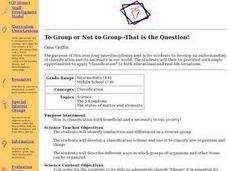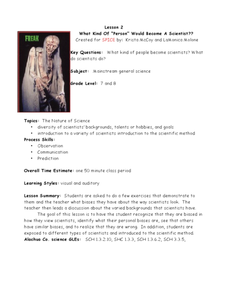Virginia Department of Education
A Dichotomous Key of Virginia’s Native Plants
Can your class correctly classify plant species? Individuals explore native plants of the local environment and correctly classify them into their respective categories. They investigate differences in the plants and discuss similarities...
Royal Society of Chemistry
Acids and Alkalis
Is your acid-base chemistry lesson plan a little ho-hum? Spice things up with puzzles! Young chemists manipulate facts about acids and bases to solve a series of interactive puzzles. The activity combines content knowledge and...
WE Charity
High School–Module 1: Sustainable Innovation
What does it mean to have an innovative mindset? Pupils think outside the box with the first of five lessons from the WE Are Innovators—High School Modules set. Scholars read articles and watch videos about sustainable innovation, such...
Alabama Learning Exchange
The Big Bang Theory: An Evidence-Based Argument
What evidence supports the big bang theory? Individuals analyze scholarly resources about the the theory and develop arguments backed by evidence. They brainstorm, share ideas, watch a video, and read articles to complete a graphic...
Curated OER
Lesson Plan: Global Warming
Students explore the concept of global warming. In this climate change lesson, students explore the provided links to PBS NOW sources and research the greenhouse effect and the effects of global warming. Students support their stances on...
Curated OER
National Estuarine Research Reserve System
Students investigate the benefits of estuarine research reserves. In this National Estuarine Research Reserve lesson plan, students learn how to obtain information on the 26 reserve sites, they discuss the importance of the reserve...
Curated OER
Fabulous Forensic Fingerprints
Students explore the uniqueness of each person's individual body. They identify traits and characteristics of the human body, with a main focus on the uniqueness of fingerprints and footprints. Students examine and compare fingerprints....
Curated OER
Archaeology and Storytelling
Students identify and interpret both individual families and whole cultures learn about their pasts by collecting and analyzing stories and artifacts. Then they identify that not all archaeological finds readily reveal their history to...
Curated OER
Finding Balance
Young scholars examine the relationships between force, mass and balance through the lens of clay sculpture. They discuss the definitions and concepts behind Newton's Third Law of motion then individually apply these principles to the...
Curated OER
How would an oil spill affect a Marine Sanctuary?
Students explore the concept of environmental stewardship. In this science lesson, students discover how scientists assess damages to the environment following oil spills. Students conduct a simulation of a public meeting in order to...
Curated OER
Wind
Students make a wind vane, anemometer, wind spiral, and wind streamer to calculate wind movement. In this wind lesson plan, students test each of their wind instruments, and graph the results of the wind speed in different locations.
NASA
Model Development Assessment Activity
Time to show off what they've learned! The final lesson in the series of six asks young scholars to process their learning from the previous lessons. They identify possible elements of the sun as well as a possible origin.
Laboratory for Atmospheric and Space Physics
Where Are We Going?
Come take a ride on the space bus! Scholars go on an imaginary trip to pick up their peers from the inner and outer planets while reinforcing math skills. First, learners round decimals to identify each planets' distance from Earth....
Laboratory for Atmospheric and Space Physics
The Planets and Scale
Scholars gain an insight into the relative size of planets and distance between inner and outer planets with the help of informational text, a data table, and a series of four questions.
University of Colorado
Planetary Distances on the Playground
Earth is 149,600,000 km, or 92,957,130.4 miles, from the sun. Young astronauts create an interactive model to learn the distances between planets. Nine groups, each representing a different planet, are spread around at class-calculated...
Howard Hughes Medical Institute
The Teosinte Hypothesis
Don't want to sound corny, but your class will be a-maize-d by an engaging activity! Explore the history of the modern corn plant through a video and Punnett squares. Junior genetics experts get hands-on experience with actual research...
University of Colorado
Terra Bagga
One way to identify possible volcanic activity on other planets is by testing the planet for magnetism. A science lesson begins with pupils constructing their own planet from a dead battery, magnets, paper, and tape before labeling the...
Curated OER
Fresh Foods from Farm to Table
Are you a good egg? Learners begin a farm-to-table lesson by acting out verbs in groups to demonstrate the egg production process, and then research the steps using online resources. Several excellent videos are linked through the...
Curated OER
Biomass: Potato Power
Students put together a potato battery that powers a digital clock. In this potato battery lesson plan, students learn the connection between energy from biomass and how we can apply it.
Teach Engineering
Basically Acids
Base your lesson plan on acids and bases on an informative resource. The first installment of a five-part module on the science behind Harry Potter has individuals investigate acid/base chemistry with the use of invisible inks. They also...
Curated OER
To Group of Not to Group - That is the Question!
Upper elementary and middle schoolers use their observation skills to group different kinds of candy by similar characteristics. They debate whether or not we should classify objects. Finally, they learn that biologists have developed a...
Curated OER
What Kind of "Person" Would Become a Scientist?
"Scientist Stereotypes" could be another name for this instructional activity! Begin by drawing from middle schoolers' preconceived notions and media portrayal of scientists, and then explain that anyone can be a scientist. Even though...
American Chemical Society
Different Substances React Differently
Looks don't tell the whole story. Young experimenters explore reactions with substances that look similar. They observe the reactions that take place when combined with baking soda and use indicators to conclude they react differently...
American Chemical Society
What’s the Difference between Baking Soda and Baking Powder?
Introduce pupils to chemical reactions. Using the hands-on lesson, learners experiment with substances that combine to form a gas. Different substances react to form different amounts of gas, leading to a discussion about the particles...


